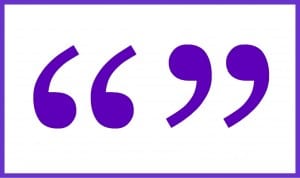 In the realm of PR, a multi-billion dollar global industry employing tens of thousands of people that encompasses multitudinous platforms to convey the messages of the world’s most important companies, it still boils down to a few words.
In the realm of PR, a multi-billion dollar global industry employing tens of thousands of people that encompasses multitudinous platforms to convey the messages of the world’s most important companies, it still boils down to a few words.
The quote. For all the changes in PR since the digitization of, well, just about everything, and amid the multi-media sweep of new possibilities to promote and persuade, the coin of the realm is still the publication or broadcast of something positive that someone said about a company.
A quote. About 8 to 12 words that can sell stuff more authentically than any ad. I read about that, it sounds cool. That’s earned media. Credibility you can’t buy with a million bucks of the most dazzling paid media. Sure, advertising can seduce. It works on the senses, on the heart, in a sense. That can be very persuasive, but also fundamentally subjective, unpredictable and notoriously fickle. Earned media, on the other hand, wins minds. A positive quote in an objective news source can inspire lasting trust and conviction, not just the typically ephemeral quiver of appetite (or annoyance, for that matter) induced by an ad.
I’m often asked how to increase the likelihood of being quoted. Or even if there is a way to guarantee it. As to the latter, well, yeah, there’s a way, sort of. You can say something outrageous. That will usually get you quoted. You can slam the competition. That tends to work too. You can diss your own company. That will also, exponentially in fact, increase the possibility of getting your name out there.
The problem of course is that negativity creates bad vibes. It leaves a sour taste. It may glisten tantalizingly for a moment, or even for a whole 24-hour news cycle, but, ultimately, it is a distraction. Positivity is more likely to convince someone to buy what you’re selling. We know that from our own experience. We purchase something because of what it has to offer us, the benefit we will get, how appealing it is. Not merely because we’ve heard something else isn’t as good.
Yes, negative quotes are, arguably, sexier, so to speak. That’s why reporters so often traffic in the negative. Outrage, scandal, meanness, boasting – all electrify quickly, superficially, dependably. But it’s the positive quote that sinks in more substantively, sustainably.
There are ways to increase the likelihood of a positive quote getting out there. Here are the basics:
- Have a strong point of view. Be bold. Don’t get complicated. These days, information is less important than opinion. We are all now used to strong points of view flinging through our lives from every direction. Readers and viewers like it, so journalists want it. Attitude. Cop one. Or a few, on the key issues, products, plans you are likely to be asked about. Simply enough, be a true believer in what you do, what you make. Express that with conviction, repeatedly.
- Start with your conclusion. Make statements. Don’t build arguments. Assert an idea, backed up by an example to prove it. Don’t defend your case. That tends to take too many words. Conclusions, after all, are the ultimate positive quote. Get to the point. If a reporter wants your whole story in detail, let them ask for it. Most will not.
- No commas. All right, maybe a few commas are inevitable. But be aware of a tendency to speak in long, elaborated sentences, full of punctuation. Speak in comma-less declarative sentences as much as possible. Say one thing at a time. Put a period on the end of it. Then move on to the next thing.
- Practice – but never memorize. Find your key ideas and most important examples – the core of what you want to say – and then practice aloud. Just talk. With a coach, a colleague, in your car, in the shower, rehearse responding to the questions are most likely to get.
- Trust yourself. The best quotes emerge unexpectedly. Organically. From a strong point of view, spoken with energetic conviction. Not from thinking through a clever answer or regurgitating a bullet point. Trust yourself to just be yourself, and good things will happen. The best quotes are not pre-cooked. They just happen.
The good news about being interviewed, as we always tell clients, is that the more fun you have the more credible you will be. Enjoy telling your story. That’s how 8 to 12 irresistible words can emerge from thousands: the quotes that are still very much the coin of the PR realm.


